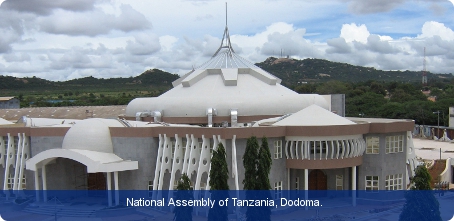Government
- Overview
- History

The United Republic of Tanzania is a republic with an executive president. The president is elected in separate presidential elections held simultaneously with general elections; both elections are held by direct popular vote every five years. The president must represent a registered political party, and is permitted to serve a maximum of two terms.
The president appoints a prime minister who serves as the government leader in the Assembly. The president selects the cabinet from the National Assembly. He or she may also nominate 10 non-elected members of parliament who can serve in the cabinet.
The unicameral legislature is the National Assembly. Some of the members are directly elected by universal adult suffrage (in 239 constituencies in 2010). Other members include the attorney-general; female members nominated by the parties in proportion to the number of seats they hold in the Assembly; up to ten presidential appointees and five delegates from the Zanzibar parliament.
Zanzibar is a semi-autonomous part of Tanzania with its own president, devolved government and legislature. Zanzibar’s House of Representatives consists of 50 directly elected members, 15 female nominees (by the parties in proportion to the number of seats they hold in the house), ten presidential nominees, and five ex officio members; one seat is reserved for the attorney-general.
The House is responsible for legislation on domestic matters and, in practice, external trade.
The Court of Appeal is the supreme court and the final appellate court, and is presided over by the chief justice. The High Court has its headquarters in Dar es Salaam and is itinerant, holding sessions in the regions. It has unlimited civil and criminal jurisdiction and hears appeals arising in the lower courts.
The district courts and magistrates’ courts are presided over by magistrates, the primary courts having more limited jurisdiction than the district courts. Other more specialised courts include the Commercial Court and the Land Court.
The president appoints the chief justice and judges, judges of appeal with the advice of the chief justice, and High Court judges with the advice of the Judicial Services Commission. Judges of Appeal and High Court judges have tenure of office until retirement, unless their removal is recommended by a panel of judges from other Commonwealth countries.

According to evidence at Olduvai Gorge and in the Manonga Valley, Tanzania may be humanity’s place of origin. Around AD 500 Bantu peoples, the ancestors of the majority of the modern population, began entering the area.
In 1884 Dr Karl Peters journeyed into the interior to acquire territory, through treaties with chiefs, on behalf of the German emperor. In the late 1880s Germany took over the area from the coast to (and including) Ruanda and Urundi, calling it the Protectorate of German East Africa.
In 1919 the League of Nations gave Britain a mandate to administer part of German East Africa, now known as Tanganyika. In 1946 Tanganyika became a UN trust territory.
In 1954 Julius Nyerere founded the Tanganyikan African National Union (TANU), which promoted African nationalism and won a large public following. Elections were held in 1958-59 and again in 1960. The result was overwhelming victory for TANU, which by this period was campaigning for independence as well as majority rule. The new government and the UK agreed at a constitutional conference to full independence for Tanganyika in December 1961. In 1962 Tanganyika became a republic, with Nyerere as its first president.
In 1964 Tanganyika and Zanzibar united as the United Republic of Tanzania. Zanzibar had become independent as a separate country the previous year.
In 1967 Nyerere made the Arusha Declaration, unveiling his political philosophy of egalitarianism, socialism and self-reliance. In 1977 TANU and the Afro-Shirazi Party merged to form the Chama Cha Mapinduzi (CCM). Ali Hassan Mwinyi succeeded Nyerere in 1985. Nyerere died in October 1999 after a long illness.
Presidential elections were held every five years from 1965 with, under the one-party system, the electorate voting ‘yes’ or ‘no’ to a single presidential candidate. In parliamentary elections, in each constituency the choice was between two candidates put forward by the CCM. Opposition parties were legalised in 1992.
The CCM has continued to dominate Tanzanian politics. In the 2010 national presidential election, with a turnout of 42%, Jakaya Kikwete of the CCM was returned with 61.2% of the votes cast, while Willbrod Slaa of Chama Cha Demokrasia na Maendeleo (CHADEMA) secured 26.3% and Ibrahim Lipumba of the Zanzibar-based CUF. In the concurrent parliamentary elections the CCM won 186 seats, the CUF 23 and CHADEMA 22.







